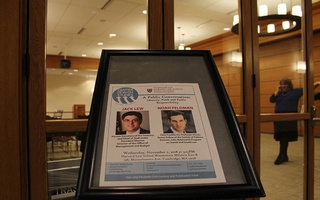Several weeks ago, the University of California, Los Angeles student council first rejected, and then subsequently confirmed, the nomination of sophomore Rachel Beyda for a position on the student government’s judicial board. The original refusal centered on questions about her Jewish faith, with some student council members charging that it might bias her judgement. Only after a faculty member intervened to request the council set aside issues of religion did Ms. Beyda receive approval to join the board. We find it hard to draw any conclusion except that the student council voted against Ms. Beyda solely because of opposition to her religious beliefs. We condemn this and any other forms of religious discrimination wholeheartedly.
During the meeting, some council members expressed concern about Ms. Beyda’s Jewish faith and involvement with Jewish organizations on campus. In their view, such activities represented a potential conflict of interest with any potential Israel-related issues. Even if one previous case had involved a trip to Israel, as was noted during the meeting, automatically assuming that Ms. Beyda’s religious affiliation impaired her ability to think clearly and fairly smacks of anti-Semitism.
Having perspectives, opinions, and thoughtful ideas is not dangerous—in fact, it should be considered beneficial. We all have worldviews that shape us: Our life experiences, racial background, sexual orientation, family upbringing, cultural values, and political views all influence how one might vote on the UCLA judicial board.
In fact, many who participate in student government are also involved in other extracurriculars, yet were not placed under the same harsh scrutiny as Ms. Beyda. Involvement in groups that are defined by political affiliation, sexual orientation, or even racial identity are rarely, if ever, considered sources of potential conflicts of interest for members of student government. To single out ethnic and religious views as problematic is not only dangerous but also racially and religiously discriminatory.
Moreover, even if there had been a legitimate concern that her involvement in Jewish campus organizations would pose a conflict of interest in certain judicial board cases, this should not have prevented her from being approved for a role on that board. There would be precedent for such situations: Proper procedure would be for her to remedy this actual conflict of interest by recusing herself, not for the council to reject her wholesale as a candidate. The board would thus still able to enjoy the benefits of her judgment in the vast majority of cases—as the student body at UCLA will now fortunately be able to do. Again, though, Ms. Beyda's place in religious groups should not require such procedures.
Had the vote not been reversed, this incident would not only have deprived UCLA of a juror that all agree was highly qualified but also have set a dangerous precedent. This incident is yet another reminder that the irrelevancy of a candidate's racial or ethnic background, religious affiliation, sexual orientation, family background, and socioeconomic status must be reaffirmed. These differences should not be a tool for separation or discrimination—we are enriched and educated through exposure to diverse worldviews. We must cherish that belief and never waver in our resolve to eliminate discrimination on any basis.
Read more in Opinion
The First Rule of Final ClubRecommended Articles
-
Jews, Judaism, And the UniversityThe following is the full text of a sermon delivered in Memorial Church September 14 by Rabbi Ben-Zion Gold, director
-
Students' Teas at Brooks House.The parlor of Phillips Brooks House will be open on Friday afternoons from four to six during the rest of
-
Religious Identity Does Not Go Hand in Hand With PoliticsTo the editors: I am not sure whether David Golding was being deliberately provocative or just asinine in his comment
-
College Surveys Students' Religious AffiliationsUndergraduates registering for the spring semester this past week were asked their religious identification and affiliation, as part of an effort both to gauge the religious demographics at the College and connect students with appropriate Harvard chaplains.
-
 Former Treasury Secretary Lew Talks Faith and Politics at Harvard Law
Former Treasury Secretary Lew Talks Faith and Politics at Harvard Law













